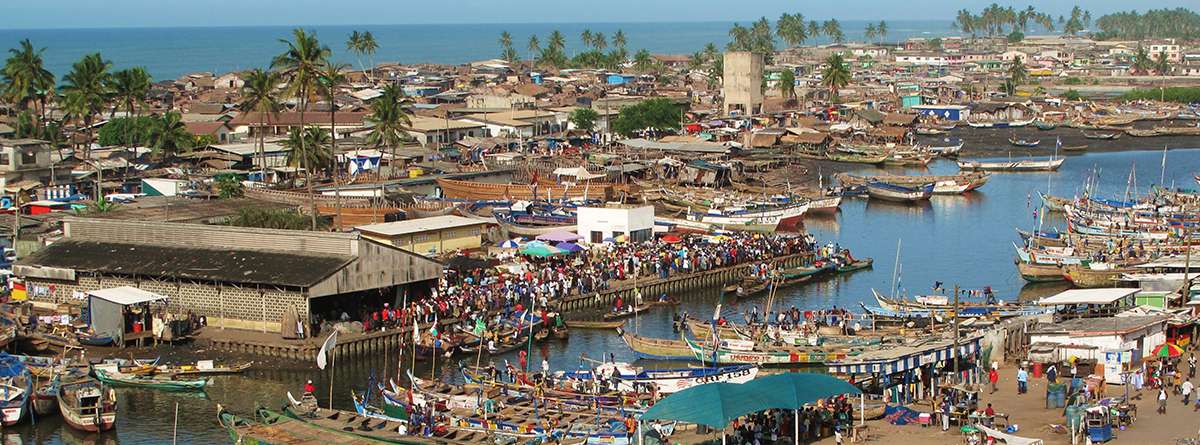Ghana

Ghana Revenue Authority Contacts:
Website: http://www.gra.gov.gh/
Email: info@gra.gov.gh
Telephone: +233- (0) 302 675701-9/684363-686106/684363
Address: Off Starlets' 91 Road, near Accra Sports Stadium, P. O. Box 2202, Accra, Ghana
Fax: +233- (0) 302 681163/664938
Republic of Ghana is a sovereign unitary presidential constitutional democracy, located along the Gulf of Guinea and Atlantic Ocean, in the subregion of West Africa.
A multicultural nation, Ghana has a population of approximately 27 million, spanning a variety of ethnic, linguistic and religious groups. Its diverse geography and ecology ranges from coastal savannahs to tropical jungles. Ghana is one of the world's largest gold and diamond producers, and is projected to be one of the largest producer of cocoa. Ghana's growing economic prosperity and democratic political system has made it a regional power in West Africa.
Tariffs
Tariffs and duty rates are constantly revised and are subject to change without notice. Customs duty exemptions are available for all agricultural, industrial plant, machinery and equipment imported for investment purposes.
Customs clearance of cargo through the seaports involves dealing with a number of logistics service providers and governmental bodies in order to fulfil all contractual and tax obligations that might be associated with the import consignment. The agencies include Customs Excise and Preventive Service (CEPS), the Ghana Ports and Harbours Authority (GPHA), Shipping Agents and Destination Inspection Companies.
Ghanaian law enjoins all importers with the exception of Declarants to engage the services of licensed Customs House Agents for the clearance of cargo at any freight station in Ghana.
There are various stages in the customs clearance processes of cargo from the seaport. The clearance process starts with the valuation of the cargo, declaration of cargo data on to the GCNET, payment of duty and other relevant cargos, verification at the Compliance Section of CEPS, release by the Shipping Agent, delivery by GPHA and CEPS physical examination or scanning of cargo before cargo is allowed to exit the port.
Exporting
Exporting is divided into traditional and non-traditional.
Traditional Exports include: cocoa, timber / lumber, mineral resources, electricity etc.
Requirements
1. Register with the Registrar-General’s Department and the Ghana Export Promotion Council.
2. Obtain BOG Foreign Exchange Declaration Form (FXD Form 4A) which can be downloaded from the Bank of Ghana.
3. Obtain permits/certificates from issuing institutions (e.g. Ghana standard board quality assurance certificate for fresh/processed fish to EU countries, COCOBOD Quality Assurance Certificate for fresh/processed fish to EU countries, COCOBOD Quality Control Certificate in the case of coffee, sheanut, cashew nuts, packing list in the case of personal effects etc).
4. Obtain the Customs Entry Form.
5. Obtain certificates of origin (EURI Form) from CEPS for goods which are to benefit from preferential tariff treatment in the EU and other preference giving countries.
Non Traditional Exports include: yams, pineapples, handicrafts, cashew nuts, coffee, canned fish (tuna), shea butter, kente cloth, cocoa butter, cocoa cake, aluminium products, textiles (AGOA)
Requirements
- Obtain a Non Traditional Export Form from the Customs Export shed at the Port/Frontiers.
- Obtain certificates of origin (EURI) from Customs for goods to benefit from preferential treatment in the EEC and other preference giving countries.
General Import Procedures
1. Original Bill of Lading/Airway Bill
2. Invoice
3. Packing List
4. Final Classification and Valuation Report (FCVR)
5. Import Declaration Form (IDF) from the Ministry of Trade and Industry.
6. Tax Clearance certificate from the Domestic Tax Revenue Division issued in the name of the importer or 1% of CIF payment fee.
7. Tax Identification Number (TIN) from the Ghana Revenue Authority.
8.Permit or License from the appropriate Ministry/ Agency Department as applicable for restricted goods.
9.Appropriate letter of Exemption from payment of duty and/or taxes as applicable.
Procedure
1. Submission of Import Declaration Form (IDF), Bill of Lading, Invoices and Packing List to the appropriate Destination Inspection Company for the issuance of a Final Classification and Valuation Report (FCVR).
2. Submission of application to appropriate Ministry/ Department/Agency for the relevant License/Permit/Exemption
3. Electronic submission of declaration
4. Payment of Duties and Taxes at the designated Banks located at Longroom
5. Subject yourself and goods to Customs documentary and physical verification as may be determined
6. Release and/or further processing depending on regime
Sources:
http://www.gra.gov.gh/docs/info/customs_guide.pdf
http://www.gra.gov.gh/index.php/divisions/customs
